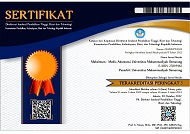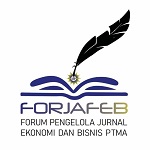Determinants of the Quality of Village Government Financial Statements
(1) Universitas Muhammadiyah Yogyakarta
(2) Universitas Muhammadiyah Yogyakarta
(3) Universitas Muhammadiyah Yogyakarta
(*) Corresponding Author
Abstract
This study examines the effect of information technology, transparency, human resource competence, and internal control systems on the quality of financial reports. It looks at the effect of accountability variables as intervening variables on human resource competencies and internal control systems. The problem under study is that there are still many cases of budget misappropriation caused by the poor quality of financial reports in the village government of Gunungkidul Regency. The type of research data is primary data obtained by distributing questionnaires. This study received a sample of 204 respondents in 144 villages and was selected by purposive sampling method aimed at village officials, namely the village head, village secretary, and village treasurer. The results of this study indicate that Utilization of information technology, Transparency, Human Resource Competency, and Accountability positively affect the quality of financial reports on village governments. Meanwhile, the internal control system cannot improve the quality of financial reports. Practically, this study provides input to the central government and village governments to improve related factors that can improve the quality of financial statements.
Keywords
Full Text:
PDFReferences
Anggriawan, F. T., & Yudianto, I. (2018). Factors affecting information quality of local government financial statement. Journal of Accounting Auditing and Business, 1(1), 30-42.
Atmadja, A. T., & Saputra, K. A. K. (2018). Determinant factors influencing the accountability of village financial management. Academy of Strategic Management Journal, 17(1), 1-9.
Chin, W. W., Marcolin, B. L., & Newsted, P. R. (2003). A partial least squares latent variable modeling approach for measuring interaction effects: Results from a Monte Carlo simulation study and an electronic-mail emotion/adoption study. Information systems research, 14(2), 189-217.
Donaldson, L., & Davis, J. H. (1991). Stewardship theory or agency theory: CEO governance and shareholder returns. Australian Journal of management, 16(1), 49-64.
Fornell, C., & Larcker, D. F. (1981). Evaluating structural equation models with unobservable variables and measurement error. Journal of marketing research, 18(1), 39-50.
Ghasemi, M., Shafeiepour, V., Aslani, M., & Barvayeh, E. (2011). The impact of Information Technology (IT) on modern accounting systems. Procedia-Social and Behavioral Sciences, 28, 112-116.
Hadis, F., Ihsan, H., Dwiharyadi, A., Septriani, Y., & Afni, Z. (2022). Pengaruh Pemanfaatan Teknologi Informasi, Kompetensi Sumber Daya Manusia Terhadap Kualitas Laporan Keuangan. Akuntansi dan Manajemen, 17(2), 106-121.
Hair, J. F., Money, A. H., Samouel, P., & Page, M. (2007). Research methods for business. Education+ Training, 49(4), 336-337.
Hair, J. F., Risher, J. J., Sarstedt, M., & Ringle, C. M. (2019). When to use and how to report the results of PLS-SEM. European business review, 31(1), 2-24.
Hair Jr, J. F., Sarstedt, M., Hopkins, L., & Kuppelwieser, V. G. (2014). Partial least squares structural equation modeling (PLS-SEM): An emerging tool in business research. European business review.
Hair Jr, J. F., Sarstedt, M., Ringle, C. M., & Gudergan, S. P. (2017). Advanced issues in partial least squares structural equation modeling. saGe publications.
Hanun, N. R. (2020). Persepsi Stakeholders dalam Kesiapan dan Pelaksanaan Pelaporan Keuangan desa Berbasis Undang-Undang No. 6 Tahun 2014. Akuntansi: Jurnal Akuntansi Integratif, 6(1), 1-14.
Hasliani, M. Y., & Yusuf, M. (2021). Pengaruh Implementasi Aplikasi Sistem Keuangan Desa dan Transparansi terhadap Kualitas Laporan Keuangan Pemerintah Desa. YUME: Journal of Management, 4(1).
Indrayani, K. D., & Widiastuti, H. (2020). Pengaruh Penerapan Sistem Akuntansi Keuangan Pemerintah Daerah dan Sistem Pengendalian Internal Terhadap Kualitas Laporan Keuangan Pemerintah Daerah Dengan Kompetensi Sumber Daya Manusia Sebagai Variabel Moderasi (Studi Empiris Pada Satuan Kerja Perangkat Daerah Kabupaten Klaten). Reviu Akuntansi dan Bisnis Indonesia, 4(1), 1-16.
Jayanti, L., & Suardana, K. A. (2019). Pengaruh kompetensi SDM, moralitas, whistleblowing dan SPI terhadap pencegahan fraud dalam pengelolaan keuangan desa. E-Jurnal Akuntansi, 29(3), 1117-1131.
Khotimah, C., Bawono, I. R., & Mustafa, R. M. (2021). Determinants Analysis For The Quality Of Village Financial Statements. Jurnal Reviu Akuntansi dan Keuangan, 11(1), 185-203.
Kluvers, R., & Tippett, J. (2010). Mechanisms of accountability in local government: an exploratory study. International Journal of Business and Management, 5(7), 46.
Kumar, P., & Sivaramakrishnan, K. (2008). Who monitors the monitor? The effect of board independence on executive compensation and firm value. The Review of Financial Studies, 21(3), 1371-1401.
Lubis, N. K. (2017). Faktor Faktor yang Mempengaruhi Transparansi Pelaporan Keuangan dan Pengaruhnya Terhadap Kualitas Pelaporan Keuangan. Jurnal Penelitian Ekonomi Akuntansi (JENSI), 1(2), 124-136.
MacKenzie, S. B., & Podsakoff, P. M. (2012). Common method bias in marketing: Causes, mechanisms, and procedural remedies. Journal of retailing, 88(4), 542-555.
Meutia, I., & Liliana, L. (2017). Pengelolaan Keuangan Dana Desa. Jurnal Akuntansi Multiparadigma, 8(2), 336-352.
Podsakoff, P. M., MacKenzie, S. B., Lee, J.-Y., & Podsakoff, N. P. (2003). Common method biases in behavioral research: a critical review of the literature and recommended remedies. Journal of applied psychology, 88(5), 879.
Rifandi, Z. W. (2019). Pengaruh Implementasi Aplikasi Sistem Keuangan Desa, Kompetensi Sumber Daya Manusia, Dan Transparansi Terhadap Kualitas Laporan Keungan Pemerintah Desa. Jurnal Riset Akuntansi Tirtayasa, 4(1), 1-17.
Roviyantie, D. (2011). Pengaruh kompetensi sumber daya manusia dan penerapan sistem akuntansi keuangan daerah terhadap kualitas laporan keuangan daerah. Universitas Siliwangi.
Saputra, J. (2014). Pengaruh Kejelasan Sasaran Anggaran, Kinerja Manajerial, dan Pelaporan/ Pertanggungjawaban Anggaran Terhadap Akuntabilitas Kinerja Instansi Pemerintah. Jurnal Fakultas Ekonomi Universitas Maritim Raja Ali Haji.
Shmueli, G., & Koppius, O. R. (2011). Predictive analytics in information systems research. MIS quarterly, 553-572.
Sofyani, H., Ali, U. N. N. A., & Septiari, D. (2020). Implementasi Prinsip-Prinsip Tata Kelola yang Baik dan Perannya terhadap Kinerja di Badan Usaha Milik Desa (BUMDes). JIA (Jurnal Ilmiah Akuntansi), 5(2), 325-359.
Swastika, I., & Widhiyani, N. L. S. (2020). Sistem pengendalian internal pemerintah, sistem informasi manajemen keuangan daerah, good governance dan kualitas laporan keuangan di Kabupaten Jembrana. E-Jurnal Akuntansi, 30(11), 2724-2736.
Tahir, S. Y., Malia, E., & Faisol, I. A. (2020). Pengaruh Akuntabilitas, Partisipasi Masyarakat, Pengetahuan Kepala Desa, dan Transparansi terhadap Kualitas Informasi Laporan Keuangan Desa di Kabupaten Pamekasan. Journal of Accounting and Financial Issue (JAFIS), 1(1), 20-29.
Untary, N. R., & Ardiyanto, M. D. (2015). Pengaruh Sistem Informasi Akuntansi, Sistem Pengendalian Intern dan Kompetensi Sumber Daya Manusia Terhadap Kualitas Laporan Keuangan Daerah Dengan Faktor Eksternal Sebagai Pemoderasi (Studi Kasus Pada Pemerintah Daerah Kabupaten Magelang). Diponegoro Journal of Accounting, 4(2), 199-210.
Vidyasari, F. N. a., & Suryono, B. (2021). Pengaruh akuntabilitas pengelolaan keuangan daerah dan sistem akuntansi keuangan daerah terhadap kualitas laporan keuangan pemerintah daerah. Jurnal Ilmu dan Riset Akuntansi (JIRA), 10(4).
Wardani, D. K., & Andriyani, I. (2017). Pengaruh Kualitas Sumber Daya Manusia, Pemanfaatan Teknologi Informasi, Dan Sistem Pengendalian Intern Terhadap Keandalan Pelaporan Keuangan Pemerintahan Desa Di Kabupaten Klaten. Jurnal Akuntansi, 5(2), 88-98.
Widayati, W., & Abdurahim, A. (2022). Determinan yang Berpengaruh Terhadap Kualitas Laporan Keuangan Pada Pemerintah Desa di Kabupaten Gunungkidul. Ratio: Reviu Akuntansi Kontemporer Indonesia, 3(2), 102-115.
Yaqin, A., & Jatmiko, B. (2018). Kontribusi Kompetensi Sumber Daya Manusia, Standar Akuntansi Pemerintah, Dan Sistem Pengendalian Internal Pemerintah Terhadap Kualitas Laporan Keuangan Pemerintah: Studi Kasus Pada Satuan Kerja Perangkat Daerah Kab. Biak Numfor. Reviu Akuntansi dan Bisnis Indonesia, 2(1), 1-10.
Article Metrics
Abstract view : 186 timesPDF - 4 times
DOI: https://doi.org/10.26714/mki.13.2.2023.184-194
Refbacks
- There are currently no refbacks.
-----------------------------------------------------------------------------------------------------------------------------------------------------------------------------------
 | MAKSIMUM: Media Akuntansi Universitas Muhammadiyah Semarang |
![]()
Maksimum: Media Akuntansi Universitas Muhammadiyah Semarang is licensed under a Creative Commons Attribution Attribution-NonCommercial-NoDerivatives 4.0 International License.

















